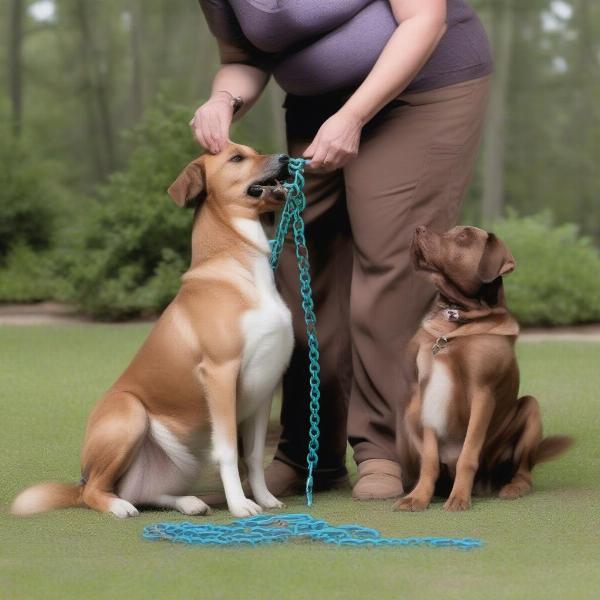Choke chains, also known as slip chains or check chains, are a type of dog collar that tightens around a dog’s neck when pulled. While they have been a common training tool for decades, their use is now widely debated among dog professionals. Understanding the potential risks and benefits of choke chains is crucial for any responsible dog owner. This comprehensive guide will delve into the intricacies of using choke chains for dogs, exploring their purpose, proper usage, potential dangers, and humane alternatives.
Understanding Choke Chain Mechanics
A choke chain is a metal chain consisting of interconnected links. When attached to a leash and pulled, the chain tightens around the dog’s neck, applying pressure as a means of correction. The pressure releases when the leash slackens. The mechanics of a choke chain rely on causing discomfort to deter unwanted behaviors. However, this very mechanism also presents significant risks if used improperly.
Potential Dangers of Choke Chains
Choke chains can cause serious physical and psychological harm to dogs if misused or used without proper training. Physical injuries can range from tracheal damage and neck injuries to strangulation. The constant pressure and jerking motions can also lead to neurological problems. Beyond the physical risks, choke chains can cause significant psychological distress, leading to fear, anxiety, and aggression.
Proper Usage of Choke Chains (If Absolutely Necessary)
While alternatives are generally recommended, if a choke chain must be used, it’s crucial to understand proper usage. The chain should be fitted high on the dog’s neck, just behind the ears, and used with short, sharp corrections, never constant pressure. It’s imperative to work with a certified professional dog trainer to learn the correct techniques and avoid causing harm.
 Dog Trainer Demonstrating Correct Choke Chain Usage
Dog Trainer Demonstrating Correct Choke Chain Usage
Humane Alternatives to Choke Chains
Many humane and effective alternatives to choke chains offer better control and training outcomes without the associated risks. Martingale collars, front-clip harnesses, and head halters are excellent choices for managing pulling and other unwanted behaviors. These tools provide gentle guidance and discourage pulling without causing pain or discomfort. Positive reinforcement training methods, combined with these humane tools, are far more effective and build a stronger bond between dog and owner.
When to Avoid Choke Chains Entirely
Choke chains should never be used on puppies, small dogs, or dogs with respiratory issues. They are also unsuitable for dogs with a history of neck injuries or behavioral problems related to fear or anxiety. In these cases, the risks significantly outweigh any potential benefits.
Choosing the Right Training Tools for Your Dog
Selecting the right training tools is paramount for your dog’s well-being and training success. Consider your dog’s breed, size, temperament, and specific training needs. Consulting with a veterinarian or certified professional dog trainer can provide personalized guidance on the most appropriate and humane training tools for your individual dog.
Are choke chains ever recommended?
While some trainers may still use choke chains, many experts advise against them due to the potential for harm. Humane alternatives are generally safer and more effective.
What are the risks of using a choke chain incorrectly?
Incorrect use can lead to serious injuries like tracheal damage, neck injuries, and even strangulation. It can also cause psychological distress, fear, and aggression.
What are some good alternatives to a choke chain?
Martingale collars, front-clip harnesses, and head halters are all humane and effective alternatives.
Can I use a choke chain on a puppy?
No, choke chains should never be used on puppies. They are too delicate and prone to injury.
Should I consult a trainer before using a choke chain?
Absolutely. If you must use a choke chain, working with a certified professional dog trainer is essential to learn proper usage and minimize risks.
What is the best way to train my dog without using aversive tools?
Positive reinforcement training methods, using rewards and praise, are widely considered the most effective and humane way to train a dog.
Are there any breeds that should never wear a choke chain?
Brachycephalic breeds (those with short noses, like Bulldogs and Pugs) and dogs with respiratory issues should never wear a choke chain.
You might also find these articles helpful: dog choke chains, dog choke chain, martingale collar for dogs. Further reading on related topics can be found at dog collar leash and harness sets and best slip lead for dogs.
ILM Dog is a leading international dog website dedicated to providing expert advice on all aspects of dog care and wellbeing. From breed selection and puppy care to senior dog health and training tips, we offer a wealth of resources to help dog owners worldwide. Our team of experts covers a range of topics including dog health, nutrition, behavior, and product reviews. For expert advice tailored to your dog’s specific needs, connect with us via email at [email protected] or phone at +44 20-3965-8624. We’re passionate about helping you provide the best possible care for your furry friend!